UnitMyfather综合英语教程
综合英语教程第三册课文翻译
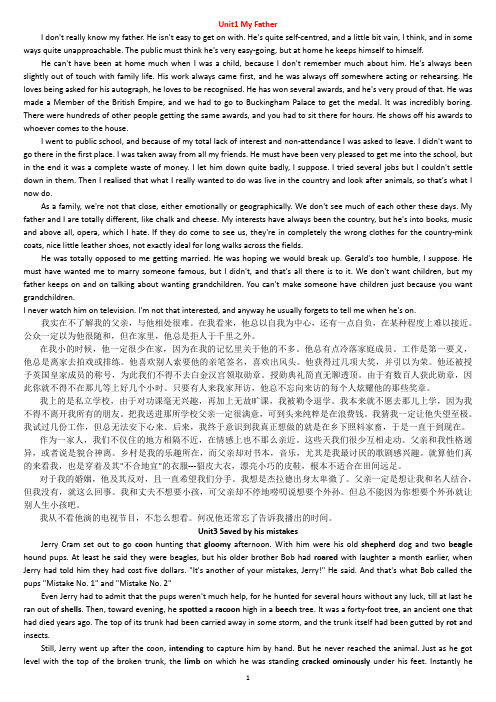
Unit1 My FatherI don't really know my father. He isn't easy to get on with. He's quite self-centred, and a little bit vain, I think, and in some ways quite unapproachable. The public must think he's very easy-going, but at home he keeps himself to himself.He can't have been at home much when I was a child, because I don't remember much about him. He's always been slightly out of touch with family life. His work always came first, and he was always off somewhere acting or rehearsing. He loves being asked for his autograph, he loves to be recognised. He has won several awards, and he's very proud of that. He was made a Member of the British Empire, and we had to go to Buckingham Palace to get the medal. It was incredibly boring. There were hundreds of other people getting the same awards, and you had to sit there for hours. He shows off his awards to whoever comes to the house.I went to public school, and because of my total lack of interest and non-attendance I was asked to leave. I didn't want to go there in the first place. I was taken away from all my friends. He must have been very pleased to get me into the school, but in the end it was a complete waste of money. I let him down quite badly, I suppose. I tried several jobs but I couldn't settle down in them. Then I realised that what I really wanted to do was live in the country and look after animals, so that's what I now do.As a family, we're not that close, either emotionally or geographically. We don't see much of each other these days. My father and I are totally different, like chalk and cheese. My interests have always been the country, but he's into books, music and above all, opera, which I hate. If they do come to see us, they're in completely the wrong clothes for the country-mink coats, nice little leather shoes, not exactly ideal for long walks across the fields.He was totally opposed to me getting married. He was hoping we would break up. Gerald's too humble, I suppose. He must have wanted me to marry someone famous, but I didn't, and that's all there is to it. We don't want children, but my father keeps on and on talking about wanting grandchildren. You can't make someone have children just because you want grandchildren.I never watch him on television. I'm not that interested, and anyway he usually forgets to tell me when he's on.我实在不了解我的父亲,与他相处很难。
Book3 Unit1 My father英语课文

Positive adjectives:
• easy-going • honest • open-minded • humorous • interesting • pleasant • pleasurable • frank • sympathetic • helpful • loyal • polite
• boastful
• vain
• greedy
• prejudiced
• cruel
• patronizing
• mean
• pretentious
• jealous
• hostile
• self-admiring
编辑ppt
Book 3-Unit 51
Neutral adjectives:
• complicated
Improving relations
• get along with
• compliment
• have a good or
• praise
friendly relationship with
•
appreciate one’s help/advice
• be on good terms with
• live happily with
• neighbors • alumnus (pl.
alumni) • alumna (pl.
alumnae) • relatives • comrade
编辑ppt
Book 3-Un1i5t 1
• employer—employee • superior—inferior/subordinate • teacher—student • doctor—patient • salesman—customer • host—guest • master—slave
全新版大学英语综合教程(第二版)B1-Unit 1 (lecture notes)
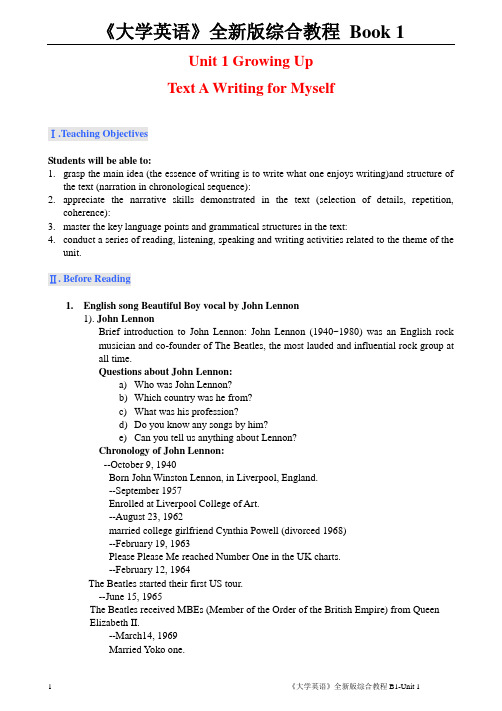
Unit 1 Growing UpText A Writing for MyselfⅠ.Teaching ObjectivesStudents will be able to:1.grasp the main idea (the essence of writing is to write what one enjoys writing)and structure ofthe text (narration in chronological sequence):2.appreciate the narrative skills demonstrated in the text (selection of details, repetition,coherence):3.master the key language points and grammatical structures in the text:4.conduct a series of reading, listening, speaking and writing activities related to the theme of theunit.Ⅱ. Before Reading1.English song Beautiful Boy vocal by John Lennon1). John LennonBrief introduction to John Lennon: John Lennon (1940~1980) was an English rockmusician and co-founder of The Beatles, the most lauded and influential rock group atall time.Questions about John Lennon:a)Who was John Lennon?b)Which country was he from?c)What was his profession?d)Do you know any songs by him?e)Can you tell us anything about Lennon?Chronology of John Lennon:--October 9, 1940Born John Winston Lennon, in Liverpool, England.--September 1957Enrolled at Liverpool College of Art.--August 23, 1962married college girlfriend Cynthia Powell (divorced 1968)--February 19, 1963Please Please Me reached Number One in the UK charts.--February 12, 1964The Beatles started their first US tour.--June 15, 1965The Beatles received MBEs (Member of the Order of the British Empire) from QueenElizabeth II.--March14, 1969Married Yoko one.--November 25, 1969Lennon returned his MRE in peace protest.--December 8, 1980Shot dead outside his apartment in the Dakota building in New York City. The Killerwas a crazed fan, Mark Chapman, who had recently obtained Lennon’s autograph.2). Beautiful Boy3). Questions about the Song and Textsa)In your opinion, what is the song Beautiful boy going to tell us?b)What does Lennon think of growing up? Is it easy of full of adventures?c)Can you guess what the texts in this unit are going to be about?2.Spaghetti1)Definition: spaghetti is the Italian-style thin noodle, cooked by boiling and servedwith sauce. Unlike some Chinese noodles, it is not served in soup and will never tastepulpy.2)Listen and practiceRead the words given below and then listen to the passage. After listening to thepassage one student is required to come up and show the right way of eating spaghettibefore the class.i.hold the fork in your hand as if to poke the spaghetti.ii.Scoop up a small amount of spaghetti on your fork and raise it about30 cm above your plate.iii.Make sure the spaghetti on your fork is completely disconnected fromthe remainder on your plate.iv.Put the prongs of the fork at an edge of the plate that is free of food.v.Quickly point the prongs of the fork straight down toward the plateand place the points on the plate.vi.Twirl the fork to gather the spaghetti around the prongs.vii.With a quick scooping movement, gather up the roll around theprongs and place it in your month.viii.Gently gather up any stray spaghetti ends that don’t make it all theway into your mouth.3.American education systemIn the U.S., education is the responsibility of individual states, not of the federalgovernment, so requirements may vary from one state to another. The following is ageneralization:Kindergarten: under 5 years oldElementary/primary school (grades 1-6): 6-11 years oldJunior high/middle school (grades7-8): 12-13 years oldSenior high school (grades9-12): 14-17 years oldCollege, institute, academy, universityⅢ. Global Reading1.ScanningScan Text A and find out all the time words, phrases and clauses.since my childhood in Belleville (LL.1-2)until my third year in high school (L.2)until then(L.3)when our classed was assigned to Mr. Fleagle for third-year English(L.7)late in the year (L.17)until the night before the essay was due. (LL20-21)when I finished (L.40)next morning (L.42)two days passed (L.42)when I saw him lift my paper from his desk…(L.45)when Mr. Fleagle finished (L.58)3.True or false1). Baker had never thought of becoming a writer until he was in the eleventh grade. (F)As a child in Belleville, he had thought of becoming a writer from time to time.2). Tea chers found it painful to read students’ long and lifeless essays. ( T ).3). Before Mr. Fleagle became the English teacher for Baker’s class, the English course hadbeen interesting. ( F ).From the words “another cheerless year” we can see the English course had been quite boring.4). In Baker’s opinion, Mr. Fleagle was really a formal, rigid and out-of-date teacher onlybecause of Fleagle’s manner of speaking. (F)Besides the manner of speaking, Fleagle’s appearance and dress also showed that he was a dull and rigid teacher.4.Multi-choice1) At first, Baker thought Mr. Fleagle’s English course was _b__.a)interestingb)dullc)hopefuld)attractive2) In Baker’s opinion, the title of the composition “What I did on My Summer Vacation”was _d__.a)dullb)unfruitfulc)difficultd)foolish and dull3) Baker liked to write a composition with the title “ The Art of Eating Spaghetti” because_c__.a)neither Baker nor Doris had ever eaten spaghetti before.b) they argued with each other at the supper.c) it remained him of the pleasure of that evening.d) spaghetti was from Italy and quite new then.4) Which of the following statements is TRUE? _a__.a)You’ll not write a good composition until you like the topic.b)When Baker wrote the essay, he thought his teacher would like it.c)Mr. Fleagle had like Baker’s compositions before.d)Baker succeeded in writing two compositions.5.Questions and answers1. As a student, Baker was long bored by writing compositions. Later, however, hisattitude changed completely. What do you think brought about this change?By reading the text, it seems that the assignment to write an essay led to the change. However, the assignment was still there as it used to be as well asMr. Fleagle. Nothing but his own understanding toward writing an essaychanged.2. Mr. Fleagle says “it’s of the very essence of the essay”, yet he gives no furtherexplanation. Think it over. What does he mean?After reading the class Baker’s essay, Mr. Flealge told the students “it’s of the very essence of the essay”. It was clear enough for the students tounderstand what the essence was. For they enjoued the essay so much thatthey should have got a clue of how to mke the essay. Just like what Baker haddone, to write as the things are and to write for your own joy, might be whatMr. Fleagle wants to illustrate.3. How do you understand the title” Writing for Myself”?To write for oneself may be a good way in making some certain articles such as essay pr poem and so on. For by reading such an essay, the readersexpect of nothing but of the author’s individual feelings toward certainmatters.Ⅳ. Detailed ReadingImportant words , phrase and difficult sentences:Part One (para.1-2)1)(para.1)off and on : or on and off: from time to time; now and again, irregularly断断续续地,有时---It has been raining on and off for a week. That’ why the clothes feel damp.---As her patient slept soundly during the night, Nurse Betty was able to doze off andon in a bedside chair.2)(para1)take hold: become established 生根,确立---The idea of one child only has taken hold in many Chinese families---老习惯总是很难摆脱的. 这就是为什么你要在习惯养成之前戒烟..---Old habits die hard. That’s why you should stop smoking before the habit takes hold.3)(para.1)bore : vt. Make sb. feel tired and lose interest 使人厌烦---The speaker went on and on, and the audience grew bored by his speech.---Tom Sawyer grew bored with painting the garden fence, so he thought of a way to make others paint for him.Collocation:A crashing bore 讨厌之极的人/事A frightful bore 讨厌得要命的家伙An insufferable bore 讨厌得让人无法忍受的人An utter bore 极惹人厌烦的事4)(para.1))associate: vt. Join or connect together; connect or bring in the mind. 使联系起来,使联想--- 我们只是把埃及和金字塔联系起来.---We often associate Egypt with pyramids.---I can’t associate this gentle you ng woman with the radical political essays she has written,.---Jim wished to forget everything associated with his former life.*associate: n. partner, 合伙人---He is not a friend, he is a business associate.他不是我的朋友,而是我生意上的合伙人。
基础英语3unit1myfather-讲稿

Book 3 Unit 1 forMy FatherI. Teaching Aims:1. Enable students to understand generation gap and different values between the young and the old.2. Enable students to contrast uncountable mass nouns with related countable nouns, such as: bread →a loaf3. Familiarize students with vocabulary: be easy to get along with, be pleased to do ... (adj. + to dosomething), vain, easy-going, keep oneself to oneself, be out of touch with, come first, be off somewhere doing something, be proud of something, show off, let somebody down, settle down, not to see much of somebody, in the wrong (right) clothes, be opposed to, humble4. Enable students to know writing skills: introducing styles of writing and train ing Ss how to describe peoplefrom subjective judgment and selected details by fragmented memor yII. Lead-in: Listening & Speaking Activities1. Brainstorming (20 minutes)1) Adjectives for describing personality (character):♦Positive adjectives: easy-going, honest, open-minded, humorous, interesting, pleasant, pleasurable, frank, sympathetic, helpful, loyal♦Negative adjectives: arrogant, dishonest, difficult, narrow-minded, boring, loathsome, unpleasant, selfish, rude, cowardly♦Neutral adjectives: complicated, reserved, silent, quiet, talkative, sophisticated, ambitious, aggressive, timid, impulsive, sociable / unsociable2) Expressions for personal appearance( one's looks):♦Size: thin, skinny, slim, slender, big, large, small, little, stout, plump, fat, robust, athletic, muscular ♦Age: old, young, look old / young, doesn't look one's age, youngish, elderly, middle-aged, in one's thirties (f orties)....♦Resemblance: look like somebody, resemble, take after somebody, have someone's eyes / nose / hair...3) Expressions for likes and dislikes:♦love, like, enjoy, be crazy / mad about, be keen on, be interested in♦dislike, feel sick about, hate, be indifferent to, don't care for, be disgusted with4) Expressions for managing relationships:♦Improving relations: get along with, have a good or friendly relationship with, be on good terms with, live happily with, be kind / nice / agreeable to, compliment, praise, appreciate one's help / advice ♦Hurting relations: laugh at, criticize, ridicule, quarrel with, split with, break up with, look down upon, interfere with one's affairs, have a bad relationship with, there is bad blood between ... and.... be difficult / hard on somebody♦Neutral: cope with, keep in touch with, be in / out of contact with5) Expressions for people we know or meet:♦friends, strangers, acquaintances, colleagues, classmates, schoolmates, roommates, fellow students, fellow workers, neighbors, alumnus (pl. alumni)♦employer -- employee, superior -- inferior (subordinate), teacher -- student, doctor -- patient, salesman -- customer, etc.2. Listening Activities (20 minutes)Topic: I have a brother♦Put some difficult words on BB.♦Play the tape without pause in order to let Ss grasp the main idea♦Explain some useful or difficult phrases♦Design some comprehensive questions and guide Ss to get specific information.♦Encourage Ss to finish the questions.♦Play the tape from beginning to end again.3. Review words and expressions learned in the brainstorming section. (5 minutes)III. Reading Comprehension and Language Activities1. Review (5 minutes)2. Pre-reading discussion: (15 minutes)1) Is there a generation gap between you and your parents?2) List at least three things that show the differences between you and your parent.3. Probe the text (35 minutes)1) Summariz ing the story and paragraphs. ( 10 minutes)In the article, the narrator presents her personal impression about her father from two perspectives: first, she describes her father’s character, which is completely different from her own; secondly, she tells the reader that she and her father have different interests. We can conclude that they are not very close.Summarize the paragraphs:Para. 1 The narrator describes her father in her eyesPara. 2 The narrator cites a number of examples to support her statement that her father is quite self-centered and a little bit vain.Para. 3 The narrator tells of her school experience to show that her father is not aware of what she really needs and how she really feels.Para. 4 The narrator examines the different interests she and her father have and tells of the gap between them.Para. 5 The narrator tells the different attitudes she and her father have towards her marriage and having grandchildren.Para. 6 The narrator tells that she is not that interested in what her father is doing.2) Text notes ( 10 minutes)3) Question s and story reproduction (10 minutes)♦Does any feel close to her father? Why or why not?♦Why doesn't she remember much about her father in her childhood?♦What is her father's job? Is he successful in his career?♦Why does she say that her father is a little bit vain?♦Why was she asked to leave school??♦Why did she give up her jobs?♦What did the father think of Amy's marriage?♦Is she going to have children?4.Detailed study of the text: (70 minutes)1) language points(1) This passage is written from a personal viewpoint. It is a daughter's view on her relationship with herfather. Passages like this usually include a number of facts, which are interpreted by the narrator from how he / she feels about them. Probably, others may have different, even opposite, views on the same facts. Readers should be aware of the subjectivity of the views expressed in this passage.(2) Para. 2. award: to give, esp. as the result of official decision (v&n)award to sb /award sb. sth.reward: v&n. (sth. Gained or received as ) a return for doing sth.good or valuable = because ofeg. They rewarded the boy with E5 for bringing the list dog back.(3) Para. 2. be proud oftake pride inpride oneself on /uponprideful adj.(4) Para. 2. It was incredibly boring: It was extremely boring. The adverb incredibly is an intensifier,denoting a high degree. The use of intensifiers is a common feature of spoken language. Similarintensifiers include "terribly", "awfully” etc.Here are two examples:e.g. I am awfully glad to see you.e.g. It was terribly cold outside.(5) Para. 2. You had to sit there for hours: The pronoun you is used here to refer to people in general,denoting a colloquial style.(6) Para. 3. Settle down1. t o sit comfortablye.g. She settled (herself) down in a chair with a book an d a cup of tea.2. (vi.) to establish a home and live a quiet life. 定居e.g. I hate all this travel; I want to get married and settle down.3. (vi.) to become used to a way of life, job, etc. 从事固定的职业,过安定的生活eg. He soon settled down in his new school.4.(vi. to) to start giving one’s serious or whole attention to a job, activities.e.g. I must settle down and do my homework. 安下心来,专心致志于(7). Para. 3. I didn't want to go there in the first place: I had no intention to go there from the verybeginning. The phrase in the first place can also1. introduce or draw attention to the illustration of a series of points or reasons,e.g. Now, in the first place, what made you leave so suddenly, and in the second place, why didyou leave no message?2. denote a very important point or reason,e.g. In the first place, I must define some terms.(8). Para. 4. that: adv. (int.) (usu. In questions and negatives) so; to such a degree.e.g. It wasn’t that good, actually. (=it was quite good but not very good). (BE·dial). I was thathungry I could have eaten a horse!(9). Para. 4. As a family, we're not that close: The word that in the sentence is an adverb toemphasise the degree of a feeling or quality (=so).Here is another example from the text: I'm not that interested.More examples:The baby cannot stay up that late. You can't have eaten that much.(10). Para. 5. break up: to come or bring to an end, esp. by separatinge.g. Their marriage broke up.The police broke up the fight.The conference broke up without reaching any agreement.2) Language workEx.1 In other wordsEx.2 Work with sentencesEx.3 Word studyEx.1 and Ex.2 are designed to give Ss an opportunity to revisit the text and refresh the knowledge of language points. Ex.3 can improve Ss’ ability to use the given prompts to produce sentences.5. Summary (10 minutes)Retell the text using the following clues.♦ a self-centred, unapproachable father♦ a little bit vain♦the writer’s school experience♦difference in interests between father and daughter♦the father’s attitude to his daughter’s marriage and having childrenIV. Extended Activities (3学时)1. Review: New words and expressions in Part II; Grammar points (15 minutes)2. Dictation (15 minutes)P8 Ex.13. Reading more: skimming and scanning (10 minutes)P9 Ex.2 My Daughter (a story told by the father, a famous actyor) by James Mitford4. Grammar work ( 20 minutes)P10 Ex.3 Difference between Count Nouns and Non-count Nouns5. Vocabulary work (10 minutes)P13 Ex.46. Translation (15 minutes)P12 Ex.57. Raising questions (10 minutes)P12 Ex.68.Writing: Styles of writing. (20 minutes)To describe people from subjective judgment and selected details by fragmented memory9. Cultural information: Gypsy (10minutes)Answer the following questions according to the cultural information.♦Who is a gypsy?♦Why are they often treated with disapproval in Britain?♦What does the word "gypsy" refer to in the US?10. Assignment (10minutes)V. Assignment (three times)1.Comprehension workP5 Ex.1 part A. B. C.2.Language workP6-7 Ex.2 part A. B. C.3.Grammar workP10 Ex.34.Vocabulary workP11 Ex.45.TranslationP12 Ex.56.Words and expressions dictation7.Story reproductionRetell the text using the following clues.♦ a self-centred, unapproachable father♦ a little bit vain♦the writer’s school experience♦difference in interests between father and daughter♦the father’s attitude to his daughter’s marriage and having children 8.Writing: Styles of writing.To describe people from subjective judgment and selected details by fragmented memory。
Unit_He_was_My_Father_综合英语教程

Language in Use
Culture Tips
Projec t
Homework
2. Look at the following pictures and discuss the questions with your partner.
Is it possible that human beings will establish a settlement on the moon?
on the moon. It is too expensive to do so. In addition, our knowledge of science and technology is not ready yet.
I think it is highly likely that human beings will build a settlement on the moon in the future. When the Earth becomes too crowded due to the population explosion, human beings will have to find new places to live.
Make your own
conversation by using the cues.
Contents
Warm-up
Readin g
Language in Use
Culture Tips
Projec t
Homework
Useful Expressions
It’s all nuisance: It’s all of no use. be fed up with: cannot stand or tolerate any more heaps of: a large amount of be criticized around the clock: be criticized (by parents) all
新世纪大学英语综合教程4课后答案(unit1-unit8)

9) a multilateral trade negotiation 10) multiform technological cooperation
2) If it were not for the expense involved, we would go there by plane.
3) If we were to miss the train, we would have to wait another four hours.
4) If we pooled all our resources, we would have enough money to buy the equipment.
However, oddly enough, many people do not feel happier than they used to be. It can be seen that there is no close correlation between people’s income and their happiness. Happiness cannot, after all, be bought with money.
2) The latest survey shows / showed that the majority of the citizens support / supported the government’s plan to build a new library.
3) The two countries could reach agreement successfully on scientific and technological cooperation because several factors favorable to their cooperation had been at work.
三年级下册英语教案Unit3ThisismyfatherLesson13人教精通版

教案三年级下册英语教案 Unit 3 This is my father Lesson13人教精通版一、教学目标1. 知识与技能:学生能够听懂、会说、会读本课句型"This ismy father/mother/…”,并能用所学句型介绍自己的家庭成员。
2. 过程与方法:通过图片展示、游戏、角色扮演等活动,让学生在真实语境中运用所学句型,提高学生的英语口语表达能力。
3. 情感态度与价值观:培养学生热爱家庭的情感,增强家庭观念,学会感恩。
二、教学内容1. 词汇:father, mother, brother, sister2. 句型:This is my father/mother/…三、教学重点与难点1. 重点:学生能够正确运用句型"This is myfather/mother/…"介绍家庭成员。
2. 难点:词汇的发音及家庭成员的介绍顺序。
四、教具与学具准备1. 教具:PPT、图片、录音机、磁带2. 学具:英语课本、练习本、彩笔五、教学过程1. 导入:播放英语歌曲"Hello, how are you?",让学生跟随音乐唱跳,营造轻松愉快的课堂氛围。
2. 新课呈现:利用PPT展示家庭成员图片,引导学生学习新词汇,并板书句型"This is my father/mother/…"。
3. 操练:组织学生进行"Who is this?"的游戏,让学生在游戏中运用所学句型,巩固知识。
4. 应用:学生分组,每组准备一张家庭成员的照片,用所学句型介绍自己的家庭成员。
六、板书设计1. 课题:Unit 3 This is my father Lesson132. 词汇:father, mother, brother, sister3. 句型:This is my father/mother/…七、作业设计1. 听力:听课文录音,跟读并模仿发音。
五年级上册英语说课稿-Unit 3《My father is a writer》(Lesson Re

五年级上册英语说课稿-Unit 3《My father is a writer》(Lesson Revision)|人教(精通)一、教材分析本节课是《My father is a writer》这一单元的复习课,主要内容是通过运用课文中的语言点,让学生能够更好的运用英语进行交流。
整节课分别包含语法、词汇、听说练习及作业练习。
教学目标:•了解并掌握本单元中的关键词汇。
•能够用英语谈论家庭成员职业。
•熟练运用简单句式描述父母工作。
•增强听力及口语交流的能力。
二、教学重点及难点本集课的教学重点是能够较为熟练地运用“my father/mother is a…”的句型,并且更好的掌握了本单元的词汇。
教学难点是让学生能够在实践中更好的运用已学过的语言点,在听说练习中能够尽可能地表达出自己的含义。
三、教学方法本节课的教学方法采用互动式授课,采用引导式提问和学生主导讨论的方式让学生更好的学习。
同时,本课程也适时设置了听力练习及口语练习环节。
四、教学步骤1.Warm up首先通过PPT展示家庭成员的图片,激起学生对于话题的兴趣,并可以更好的回忆已经掌握的相关词汇。
2.Self-introduction让学生轮流用my father/mother is a 语句介绍自己的家庭成员,同时引导学生加上一两句话对家庭成员的职业进行更详细的描述。
3.Vocabulary revision引导学生对于本单元的关键词汇进行回忆及体会,让学生用有关的形容词来对家人的职业进行语言性描述。
4.Listening practice通过课文的听力练习,在听音的前提下,加强学生的日常生活用语的组织语言能力,同时加强学生对于生活用语的理解。
5.Role play分为小组A和小组B,让同学们通过自己所学的语言点进行对话,让学生间更好的加强交流。
6.Homework家庭作业与上述内容相关,可以较好的考察学生对于本单元所学语言点的掌握程度。
五、板书设计My father/mother is a…职业相关句型writer He/She writesteacher He/She teachesdoctor He/She curesfirefighter He/She savespolice officer He/She protectsmusician He/She playspainter He/She paintschef He/She cooksactor He/She actsengineer He/She designs六、教学反思本节课在运用语言点的方面较好的让学生进行了练习,并且在听力及口语交流的演练以及重点词汇的回忆方面有明显的提高。
五年级上册英语说课稿-Unit 3 My father is a writer.Lesson 13

五年级上册英语说课稿-Unit 3 My father is a writer.Lesson13 人教精通版一、教学背景这是一节以“职业”为主题的英语课,目的是让学生了解一些职业的英文表达方式,并能简单介绍自己或家人的职业。
本课是“五年级英语上册”的第三个单元,第13个课时。
在本单元之前,学生已经学习了有关“时间”、“天气”等方面的英文表达。
二、教学目标1.知识目标:•学生能够听懂描述家人职业的英文句子;•学生能够用英文简单介绍自己或家人的职业。
2.能力目标:•学生能够运用所学英文表达自己的意愿和要求;•学生能够适当运用已学语言规则构造新的句子。
3.情感目标:•学生能够对不同职业表示尊重;•学生能够发展自信心,勇于用英文表达自己。
三、教学过程1. Warming up(1)Greeting教师与学生打招呼,互相熟悉气氛。
(2) Review教师复习有关“职业”的生词,例如writer,scientist,policeman等。
2. New Content(1)Presentation教师用“Who is he/she?”的问句展示几张不同职业的图片,并引导学生回答。
(2)Listening and Speaking教师播放听力材料,让学生听录音,从中选出句子中所描述的职业。
然后让学生模仿录音说出同样的句子。
例如:•What does your father do? He is a writer.•What does your mother do? She is a scientist.•What does your grandfather do? He is a farmer.(3)Pair work教师让学生两两合作,用英语向对方介绍自己或家人的职业,并相互提出问题。
例如:A: What does your father do? B: He is a teacher. And your mother? A: She is a doctor.(4) Reading教师分配角色,让学生出色朗读一些职业相关的句子,加强对所学内容的印象。
unit1myfather综合英语教程
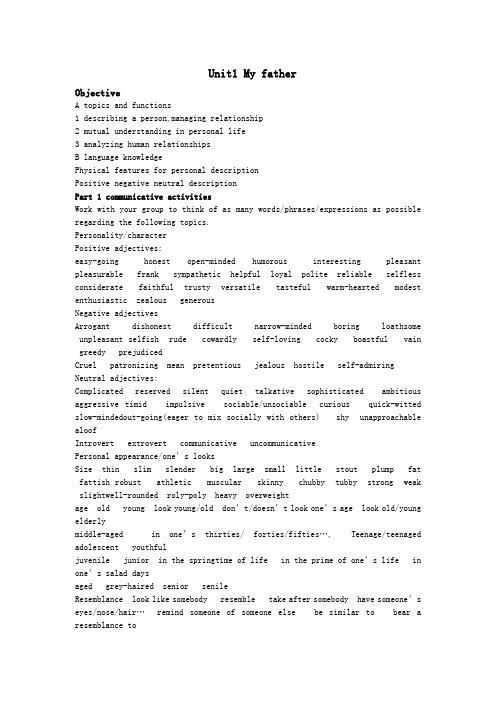
Unit1 My fatherObjectiveA topics and functions1 describing a person,managing relationship2 mutual understanding in personal life3 analyzing human relationshipsB language knowledgePhysical features for personal descriptionPositive negative neutral descriptionPart 1 communicative activitiesWork with your group to think of as many words/phrases/expressions as possible regarding the following topics.Personality/characterPositive adjectives:easy-going honest open-minded humorous interesting pleasant pleasurable frank sympathetic helpful loyal polite reliable selfless considerate faithful trusty versatile tasteful warm-hearted modest enthusiastic zealous generousNegative adjectivesArrogant dishonest difficult narrow-minded boring loathsome unpleasant selfish rude cowardly self-loving cocky boastful vain greedy prejudicedCruel patronizing mean pretentious jealous hostile self-admiringNeutral adjectives:Complicated reserved silent quiet talkative sophisticated ambitious aggressive timid impulsive sociable/unsociable curious quick-witted slow-mindedout-going(eager to mix socially with others) shy unapproachable aloofIntrovert extrovert communicative uncommunicativePersonal appearance/one’s looksSize thin slim slender big large small little stout plump fat fattish robust athletic muscular skinny chubby tubby strong weak slightwell-rounded roly-poly heavy overweightage old young look young/old don’t/doesn’t look one’s age look old/young elderlymiddle-aged in one’s thirties/ forties/fifties…,Teenage/teenaged adolescent youthfuljuvenile junior in the springtime of life in the prime of one’s life in one’s salad daysaged grey-haired senior senileResemblance look like somebody resemble take after somebody have someone’s eyes/nose/hair…remind someone of someone else be similar to bear a resemblance tobe like mirror echoLikes and DislikesLikes love like enjoy be crazy/mad/nuts about something be keen on be interested inlong for be longing to be eager to be hungry for be fond of be devoted to be thirsty for care for have a great/strong/ huge crush on someonea young girl’s crush on someone feel/be sick about somethingdislike hate be indifferent to don’t care for be disgusted with be uninterested insicken loathe feel hostile towards be unable to stand/ bear be tired of be unwilling tobe fed up withManaging relationshipsImproving relations get along with have a good or friendly relationship with be on good terms with live happily with be kind/nice/ agreeable to compliment praise appreciate one’s help/advice encourage be tolerant to approachable Hurting relations laugh at mock at criticize ridicule quarrel with split withlook down upon interfere with one’s affairs break up with have a bad relationship withthere is bad blood between…and… be difficult/hard on somebodyNeutral cope with keep in touch with be in/out of contact with communicate withApproach write to call ring up get hold of speak to phone visitcall on somebody call at some placePeople we know or meetFriends strangers acquaintances colleagues classmates schoolmates roommates playmates fellow students/ workers neighbors alumnus (pl. alumni) alumna (pl. alumnae) relatives comradeemployer—employee superior—inferior/subordinate teacher—student doctor—patient salesman—customer host—guest master—slavepart 2 reading and language activitiesTask 1Ask your partner about his/her friends based on the following questions:-- Have you any friends?-- How does he/she look like?-- What kind of person do you think he/she is?-- When did you get to know each other?-- How did you become good friends?-- How are you getting on with each other?-- What do you like to do whenyou are with him/her?Task 2In small groups, discuss the following questions:Is friendship important in your life? Why?Would you like to make friends with a nice person?How to be a nice person (a good listener or a good door opener)?Present the result of your discussion to the class.Suggested PointsAs we all know, friendship is very important in our life, and being a nice person (a good listener or a door opener) is a key factor to build close relationship with others. Therefore, many people wonder how to be a nice person (a good listener). Good listeners or door openers typically have the following elements:1Showing that you are worried about him and you want to comfort him or her with goodwill;2. An invitation to talk or to continue talking;3. Giving the speaker time to decide whether to talk and/or what he wants to say;4. Using eye contact to demonstrate your interest in and concern for the speaker;5. Being trustworthy ;6. Being understanding and tolerant to the speakers;7. Don’t laugh at or mock at the speakers when they make mistakes;8. No argument .Task 3Picture DescriptionLook at the picture in section 3C, in small groups discuss the questions on page 3, then tell your stories to the class.Discover the generation gap between you and your parents by completing the following table. If there is a big gap between you and your parents, discuss what contributes to the gap.Attitudes to and preference of: My Parents MyselfMoney and material wealthWorkFriendshipLeisure activitiesPersonal relationshipsReputationAppearanceModern technologiesPop musicTV programtext1get on with: to have a harmonious relationship with sb.Eg I am now slowly getting on better with my schoolmates.[synonym] get along with easy-going: easy to get along with2 self-centred: doing everything for the sake of oneself3 vain: having too high an opinion of one‘s looks, abilities, etc.conceited 自负 without useEg He‘s as vain as a peacock.孔雀般高傲I don't like vain women.What they have done are vain attempts.[idioms] in vain All our wok was in vain. 白费的徒劳无功的4 keep oneself to oneself: to never get in touch with sb.1st Paragraph The narrator describes her father in her eyes.我并不真正了解父亲,他不是个很容易相处的人。
2022年全新版大学英语综合教程-Unit1-6-TextA-翻译-背诵-作文
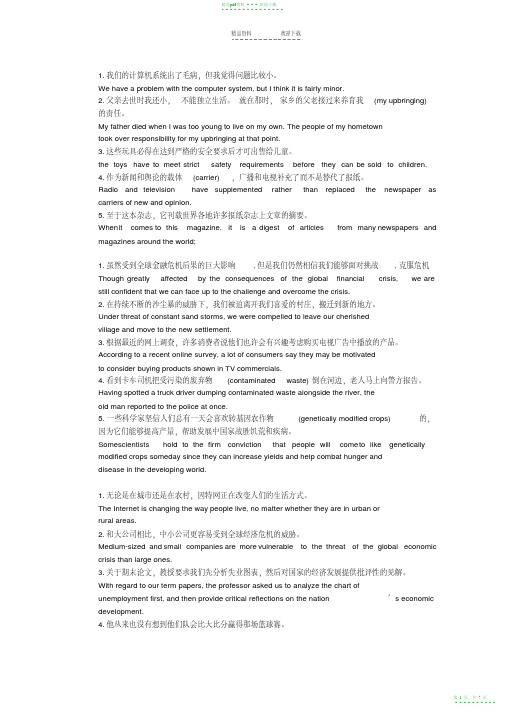
1.我们的计算机系统出了毛病,但我觉得问题比较小。
We have a problem with the computer system, but I think it is fairly minor.2.父亲去世时我还小,不能独立生活。
就在那时,家乡的父老接过来养育我(my upbringing) 的责任。
My father died when I was too young to live on my own. The people of my hometowntook over responsibility for my upbringing at that point.3.这些玩具必得在达到严格的安全要求后才可出售给儿童。
the toys have to meet strict safety requirements before they can be sold to children. 4.作为新闻和舆论的载体(carrier),广播和电视补充了而不是替代了报纸。
Radio and television have supplemented rather than replaced the newspaper as carriers of new and opinion.5.至于这本杂志,它刊载世界各地许多报纸杂志上文章的摘要。
When i t comes to this magazine, it is a digest of articles from many newspapers and magazines around the world;1.虽然受到全球金融危机后果的巨大影响,但是我们仍然相信我们能够面对挑战,克服危机Though greatly affected by the consequences of the global financial crisis, we are still confident that we can face up to the challenge and overcome the crisis.2.在持续不断的沙尘暴的威胁下,我们被迫离开我们喜爱的村庄,搬迁到新的地方。
综合英语 book3 Unit 1 My father 课文翻译
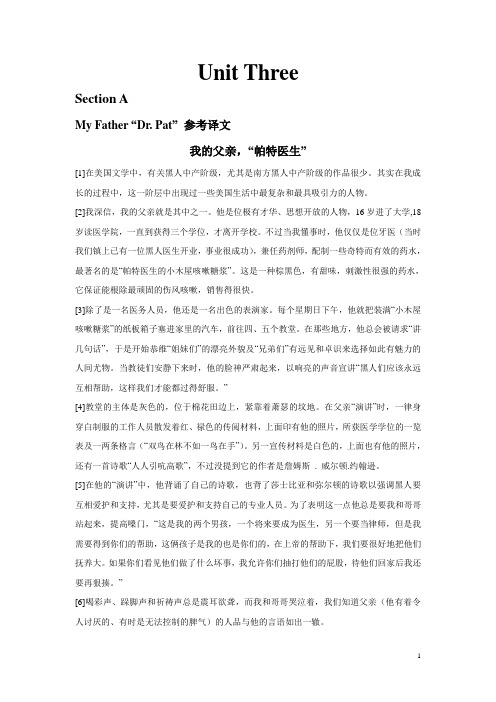
Unit ThreeSection AMy Father “Dr. Pat”参考译文我的父亲,“帕特医生”[1]在美国文学中,有关黑人中产阶级,尤其是南方黑人中产阶级的作品很少。
其实在我成长的过程中,这一阶层中出现过一些美国生活中最复杂和最具吸引力的人物。
[2]我深信,我的父亲就是其中之一。
他是位极有才华、思想开放的人物,16岁进了大学,18岁读医学院,一直到获得三个学位,才离开学校。
不过当我懂事时,他仅仅是位牙医(当时我们镇上已有一位黑人医生开业,事业很成功),兼任药剂师,配制一些奇特而有效的药水,最著名的是“帕特医生的小木屋咳嗽糖浆”。
这是一种棕黑色,有甜味,刺激性很强的药水,它保证能根除最顽固的伤风咳嗽,销售得很快。
[3]除了是一名医务人员,他还是一名出色的表演家。
每个星期日下午,他就把装满“小木屋咳嗽糖浆”的纸板箱子塞进家里的汽车,前往四、五个教堂。
在那些地方,他总会被请求“讲几句话”,于是开始恭维“姐妹们”的漂亮外貌及“兄弟们”有远见和卓识来选择如此有魅力的人间尤物。
当教徒们安静下来时,他的脸神严肃起来,以响亮的声音宣讲“黑人们应该永远互相帮助,这样我们才能都过得舒服。
”[4]教堂的主体是灰色的,位于棉花田边上,紧靠着萧瑟的坟地。
在父亲“演讲”时,一律身穿白制服的工作人员散发着红、禄色的传阅材料,上面印有他的照片,所获医学学位的一览表及一两条格言(“双鸟在林不如一鸟在手”)。
另一宣传材料是白色的,上面也有他的照片,还有一首诗歌“人人引吭高歌”,不过没提到它的作者是詹姆斯. 威尔顿.约翰逊。
[5]在他的“演讲”中,他背诵了自己的诗歌,也背了莎士比亚和弥尔顿的诗歌以强调黑人要互相爱护和支持,尤其是要爱护和支持自己的专业人员。
为了表明这一点他总是要我和哥哥站起来,提高嗓门,“这是我的两个男孩,一个将来要成为医生,另一个要当律师,但是我需要得到你们的帮助,这俩孩子是我的也是你们的,在上帝的帮助下,我们要很好地把他们抚养大。
三年级下英语【教学设计】-Unit3 This is my father-人教(精通)

三年级下英语教学设计-Unit3 This is my father-人教(精通)一、教学目标1.能够听说读写本单元的单词和基本句型:this is myfather/mother/sister/brother。
2.通过表演、游戏等方式培养学生爱国主义意识。
3.提高学生的口语表达能力和听力理解能力。
二、教学内容1. 词汇this, is, my, father, mother, sister, brother。
2. 句型This is my father/mother/sister/brother。
3. 文化中国人民解放军军歌:《义勇军进行曲》。
三、教学重点1.掌握本单元的单词和句型。
2.能够用所学的语言交流自己的家庭信息。
四、教学难点1.学生口语表达能力的提高。
2.学生理解“爱国主义”的内涵。
五、教学方法1.轻松愉快的游戏和表演。
2.围绕主题的实际情境学习。
3.通过课堂讨论和小组合作学习。
六、教学计划第一课时1.通过图片学习单词this, is, my 和 father,并进行听写练习。
2.借助《名画家》的故事,引出本单元的句型This is my father。
3.设计游戏环节,帮助学生掌握所学的单词和句型。
第二课时1.复习上节课所学内容,巩固单词和句型,并归纳所学的家庭成员单词。
2.借助《让爱传递》的故事,进一步让学生了解爱国主义思想。
3.设计表演或互动游戏,帮助学生理解“爱国主义”的内涵。
第三课时1.学生个人介绍家庭中的一位成员,并运用This is myfather/mother/sister/brother句型进行表达。
2.借助军歌《义勇军进行曲》的音乐和歌词,让学生感受爱国主义的力量。
3.设计互动猜谜游戏,巩固学生对于单词和句型的掌握。
七、教学评估1. 英语听力通过老师播放句子或者单词,让学生听写练习。
2. 英语口语分组进行学生自我介绍,要求用到This is myfather/mother/sister/brother句型。
五年级上册英语教案-Unit3Myfatherisawriter(Lesson14)|人教精通版

教案五年级上册英语教案- Unit3 My father is a writer(Lesson14) |人教精通版一、教学目标1. 知识与技能:学生能够理解并正确运用本课的重点词汇和句型,如“father, mother, writer, doctor, teacher”等,以及描述家庭成员职业的句型“What’s your father/mother? He/she is a”。
2. 过程与方法:通过听、说、读、写的训练,提高学生的英语口语表达能力和听力理解能力,培养他们合作学习和自主学习的能力。
3. 情感态度价值观:通过学习本课内容,培养学生尊重和理解不同职业的观念,激发他们对家庭成员的热爱和尊重。
二、教学内容1. 词汇:father, mother, writer, doctor, teacher等。
2. 句型:What’s your father/mother? He/she is a。
3. 对话:关于家庭成员职业的对话。
三、教学重点与难点1. 重点:掌握本课的重点词汇和句型,能够运用所学知识进行家庭成员职业的问答。
2. 难点:正确运用词汇和句型描述家庭成员的职业,以及理解并运用第三人称单数的语法规则。
四、教具与学具准备1. 教具:PPT课件、教学录音机、单词卡片。
2. 学具:学生用书、练习本、彩笔。
五、教学过程1. 导入:通过播放与本课相关的歌曲或视频,引起学生的兴趣和好奇心,引入本课的主题。
2. 新课呈现:通过PPT课件展示本课的重点词汇和句型,引导学生跟读并模仿,通过图片或实物展示,帮助学生理解和记忆单词。
3. 操练:通过小组合作、角色扮演等活动,让学生运用所学知识进行家庭成员职业的问答,巩固所学内容。
4. 巩固:通过听力和阅读练习,检测学生对本课内容的掌握程度,及时进行反馈和纠正。
六、板书设计1. 课题:Unit3 My father is a writer (Lesson14)。
Module 10 Unit 1 That is my father(教案)外研版(一起)英语一年级

Module 10 Unit 1 That is my father(教案)一、教学目标1.学会识别家人成员的称呼和外貌特征;2.学会用英语问答家人的信息;3.学会简单介绍自己的家人。
二、教学重点1.学会识别家人成员的称呼;2.学会用英语问答家人的信息。
三、教学难点学会简单介绍自己的家人。
四、教学准备1.多媒体课件;2.单词卡片。
五、教学过程1. Warming-up老师与学生打招呼,问好。
然后,老师可以根据学生的回答来提出问题,例如:•How are you today?•What day is it today?•How’s the weather today?2. Presentation1.教师出示几张图,包括父亲、母亲、儿子、女儿等人物的图片,带领学生一起辨认出不同人物,并教授相关单词。
2.向学生展示我的家谱,教授家庭成员的称呼以及相关单词。
–grandfather: 祖父;–grandmother: 祖母;–father: 父亲;–mother: 母亲;–husband: 丈夫;–wife: 妻子;–son: 儿子;–daughter: 女儿;–uncle: 叔叔;–aunt: 阿姨;–cousin: 堂兄/堂姐/表兄/表姐。
3.帮助学生记忆家庭成员的称呼。
3. Practice3.1 Task 1教师使用图片或演员进行角色扮演。
老师扮演某一成员,学生需要根据老师的描述,猜测老师扮演的家庭成员是谁。
例如,老师把一张父亲的图片贴在背后,学生只能看不到,老师要表达:“He is a man. He is tall. He has black hair. He wears glasses. He is your father.” 学生们听到之后,就要猜测这个人是谁,挑选正确的图片,拿来给老师。
3.2 Task 2学生分别介绍自己的家庭成员,包括姓名、年龄、职业、外貌特征等。
例如:•My father’s name is Jerry. He is 45 years old. He is a doctor. He is tall and thin. He has black eyes and short hair.3.3 Task 3学生进行配对游戏。
unit 3 this is my father说课稿
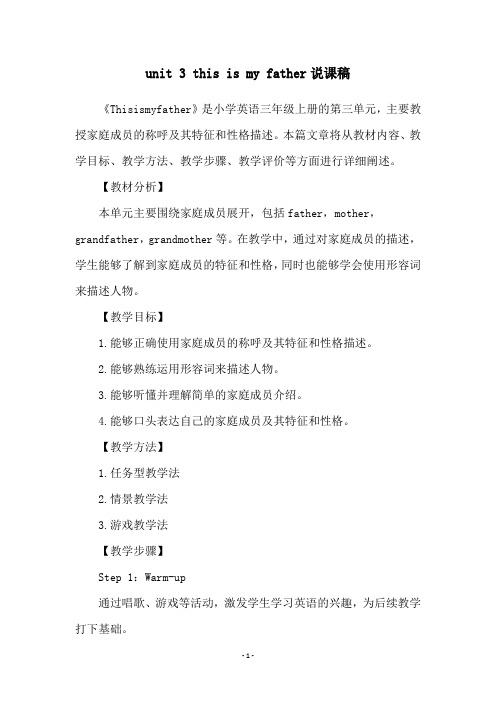
unit 3 this is my father说课稿《Thisismyfather》是小学英语三年级上册的第三单元,主要教授家庭成员的称呼及其特征和性格描述。
本篇文章将从教材内容、教学目标、教学方法、教学步骤、教学评价等方面进行详细阐述。
【教材分析】本单元主要围绕家庭成员展开,包括father,mother,grandfather,grandmother等。
在教学中,通过对家庭成员的描述,学生能够了解到家庭成员的特征和性格,同时也能够学会使用形容词来描述人物。
【教学目标】1.能够正确使用家庭成员的称呼及其特征和性格描述。
2.能够熟练运用形容词来描述人物。
3.能够听懂并理解简单的家庭成员介绍。
4.能够口头表达自己的家庭成员及其特征和性格。
【教学方法】1.任务型教学法2.情景教学法3.游戏教学法【教学步骤】Step 1:Warm-up通过唱歌、游戏等活动,激发学生学习英语的兴趣,为后续教学打下基础。
Step 2:Presentation通过图片、视频等教具,向学生介绍家庭成员的称呼及其特征和性格描述。
同时,引导学生使用形容词来描述人物。
Step 3:Practice通过问答、角色扮演等活动,让学生熟练掌握家庭成员及其特征和性格描述的表达方式。
同时,通过小组合作活动,让学生在实践中学习。
Step 4:Production让学生口头表达自己的家庭成员及其特征和性格。
同时,引导学生在实际生活中运用所学知识,增强英语口语表达能力。
Step 5:Evaluation通过听力、口语、阅读等多种方式,对学生进行评价,检验教学效果。
【教学评价】本单元教学旨在让学生掌握家庭成员及其特征和性格描述的表达方式,同时增强英语口语表达能力。
通过任务型教学、情景教学、游戏教学等多种教学方法,让学生在实践中学习。
同时,通过听力、口语、阅读等多种方式对学生进行评价,检验教学效果。
在教学过程中,要注重培养学生的兴趣和自信心,让学生在轻松愉悦的氛围中学习英语,提高英语学习的效果。
Unit3Myfatherisawriter(Lesson17)表格式全英教案

He looks great in his uniform.
He often helps people in his work.
I want to be…in the future.
2. Ss Can read and understand the dialogue.
2. Read the dialogue fluently and understand correctly
Difficulties
Make sure they can use them in the real situation.
Teaching aids
Computer,PPT.
Teaching procedure
StepThree
Practice.
and follow
the dialogue by themselves.
the dialogue in roles.
the dialogue in groups.
Practicethe dialogue.
Read in all forms can inspire their passion and improve their speaking ability.
myself, my father and my mother.
the pictures
Look,say
Introduce father’s and mother’s jobs
Chant the sentences.
It provides situations to review thelearnt words and sentences.It’s ready for the new lesson and inspire their learning interests.
- 1、下载文档前请自行甄别文档内容的完整性,平台不提供额外的编辑、内容补充、找答案等附加服务。
- 2、"仅部分预览"的文档,不可在线预览部分如存在完整性等问题,可反馈申请退款(可完整预览的文档不适用该条件!)。
- 3、如文档侵犯您的权益,请联系客服反馈,我们会尽快为您处理(人工客服工作时间:9:00-18:30)。
Unit-My-father综合英语教程————————————————————————————————作者:————————————————————————————————日期:Unit1 My fatherObjectiveA topics and functions1 describing a person,managing relationship2 mutual understanding in personal life3 analyzing human relationshipsB language knowledgePhysical features for personal descriptionPositive negative neutral descriptionPart 1 communicative activitiesWork with your group to think of as many words/phrases/expressions as possible regarding the following topics.Personality/characterPositive adjectives:easy-going honest open-minded humorous interesting pleasant pleasurable frank sympathetic helpful loyal polite reliable selfless considerate faithful trusty versatile tasteful warm-hearted modest enthusiastic zealous generous Negative adjectivesArrogant dishonest difficult narrow-minded boring loathsome unpleasant selfish rude cowardly self-loving cocky boastful vain greedy prejudiced Cruel patronizing mean pretentious jealous hostile self-admiringNeutral adjectives:Complicated reserved silent quiet talkative sophisticated ambitious aggressive timid impulsive sociable/unsociable curious quick-witted slow-mindedout-going(eager to mix socially with others) shy unapproachable aloof Introvert extrovert communicative uncommunicativePersonal appearance/one’s looksSize thin slim slender big large small little stout plump fat fattish robust athletic muscular skinny chubby tubby strong weak slightwell-rounded roly-poly heavy overweightage old young look young/old don’t/doesn’t look one’s age look old/young elderly middle-aged in one’s thirties/ forties/fifties…,Teenage/teenaged adolescent youthful juvenile junior in the springtime of life in the prime of one’s life in one’s salad days aged grey-haired senior senileResemblance look like somebody resemble take after somebody have someone’s eyes/nose/hair…remind someone of someone else be similar to bear a resemblance tobe like mirror echoLikes and DislikesLikes love like enjoy be crazy/mad/nuts about something be keen on be interested in long for be longing to be eager to be hungry for be fond of be devoted to be thirsty for care for have a great/strong/ huge crush on someonea young girl’s crush on someone feel/be sick about somethingdislike hate be indifferent to don’t care for be disgusted with be uninterested insicken loathe feel hostile towards be unable to stand/ bear be tired of be unwilling to be fed up withManaging relationshipsImproving relations get along with have a good or friendly relationship with be on good terms with live happily with be kind/nice/ agreeable to compliment praise appreciate one’s help/advice encourage be tolerant to approachableHurting relations laugh at mock at criticize ridicule quarrel with split with look down upon interfere with one’s affairs break up with have a bad relationship with there is bad blood between…and…be difficult/hard on somebodyNeutral cope with keep in touch with be in/out of contact with communicate with Approach write to call ring up get hold of speak to phone visitcall on somebody call at some placePeople we know or meetFriends strangers acquaintances colleagues classmates schoolmates roommates playmates fellow students/ workers neighbors alumnus (pl. alumni) alumna (pl. alumnae) relatives comradeemployer—employee superior—inferior/subordinate teacher—studentdoctor—patient salesman—customer host—guest master—slavepart 2 reading and language activitiesTask 1Ask your partner about his/her friends based on the following questions:-- Have you any friends?-- How does he/she look like?-- What kind of person do you think he/she is?-- When did you get to know each other?-- How did you become good friends?-- How are you getting on with each other?-- What do you like to do whenyou are with him/her?Task 2In small groups, discuss the following questions:◆Is friendship important in your life? Why?◆Would you like to make friends with a nice person?◆How to be a nice person (a good listener or a good door opener)?Present the result of your discussion to the class.Suggested PointsAs we all know, friendship is very important in our life, and being a nice person (a good listener or a door opener) is a key factor to build close relationship with others. Therefore, many people wonder how to be a nice person (a good listener). Good listeners or door openers typically have the following elements:1Showing that you are worried about him and you want to comfort him or her with goodwill;2. An invitation to talk or to continue talking;3. Giving the speaker time to decide whether to talk and/or what he wants to say;4. Using eye contact to demonstrate your interest in and concern for the speaker;5. Being trustworthy ;6. Being understanding and tolerant to the speakers;7. Don’t laugh at or mock at the speakers when they make mistakes;8. No argument .Task 3Picture DescriptionLook at the picture in section 3C, in small groups discuss the questions on page 3, then tell your stories to the class.Discover the generation gap between you and your parents by completing the following table. If there is a big gap between you and your parents, discuss what contributes to the gap.Attitudes to and preference of: My Parents MyselfMoney and material wealthWorkFriendshipLeisure activitiesPersonal relationshipsReputationAppearanceModern technologiesPop musicTV programtext1get on with: to have a harmonious relationship with sb.Eg I am now slowly getting on better with my schoolmates.[synonym] get along with easy-going: easy to get along with2self-centred: doing everything for the sake of oneself3 vain: having too high an opinion of one‘s looks, abilities, etc.conceited 自负without useEg He‘s as vain as a peacock.孔雀般高傲I don't like vain women.What they have done are vain attempts.[idioms] in vain All our wok was in vain. 白费的徒劳无功的4 keep oneself to oneself: to never get in touch with sb.1st Paragraph The narrator describes her father in her eyes.我并不真正了解父亲,他不是个很容易相处的人。
